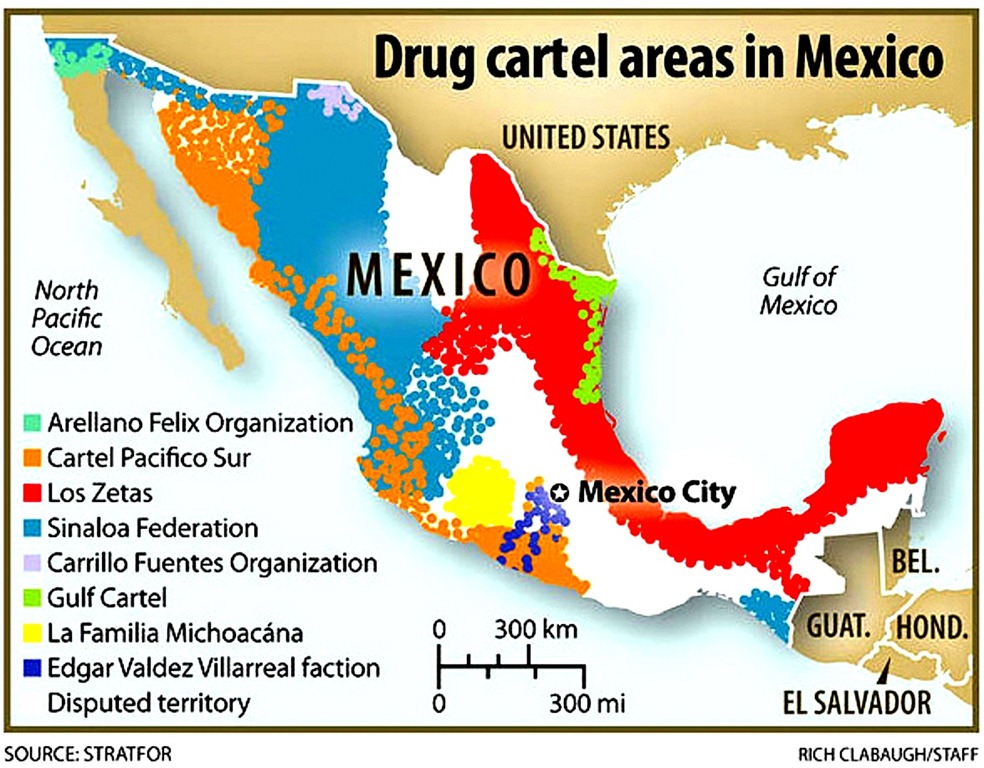Armed private security is a booming business in many parts of Latin America, and demand for personal protection services in Mexico is growing at least 20 percent a year, driven by foreign and local business executives looking to safeguard their families and employees, according to Robert Munks, a senior Americas analyst with London-based IHS-Jane’s, which tracks global security trends.
Here are two great articles that cover the current situation of security contracting both in Mexico, and on the US side of the border. The bottom line is that business is good for US executive protection providers in places like Texas, and business is good for Mexican security companies on their side of the border.
The first article talks about business on the US side and mentions a few companies that folks can check out if they are interested. The companies listed are Texas Professional Bodyguards LLC, BlackStone Group Security, Reynolds Protection and Sentry Security and Investigations LP. These are all Texas companies and it sounds like all of them have seen an increase in business.
The reason for the increase is pretty simple. Affluent Mexicans that come to the US fear getting attacked by sicarios hired by the cartels. Here is the quote that perked me up.
In Texas, crimes linked to cartels include 25 homicides since 2009 and 120 kidnappings and extortions reported since 2004 that have involved drugs and immigrants unlawfully in the country, according to the Texas Department of Public Safety. At least one Austin homicide in the past five years has been cartel-related, police have said.
The second article is a Washington Post article and it describes the private security market on the other side of the border. They basically cover what is already known and that is Mexican security companies are doing well, but US companies are limited because of the firearms restrictions. Although there is a lot of money for training and support related stuff, the reality is that you just won’t see many armed US (or other) security contractors down there because of Mexico’s Article 27 firearms codes.
On the other hand, they do mention a few companies that are operating across the border. They are DynCorp International, Kroll, Spectre Group International LLC, SECFOR, and Robert Oatman.
Personally I think Mexico is foolish for not tapping into this wartime security contracting industry. If the laws were changed and there were provisions that allowed security contractors to be armed and operate in Mexico under some type of SOFA, then you would see this side of the industry getting more involved. I mean if you have entire towns in Mexico that have become vacant because of drug violence, then that might indicate that they do not have enough competent security folks to meet then need. Just saying….
Of course training and logistical support will be there and I expect to see more of that as time goes by. Just look how much money has already been spent according to this quote?
American security aid pays for some of those programs, while other contractors are paid by the Mexican government, whose spending on security jumped from $1.7 billion in 2005 to more than $12 billion in 2011, according to the think tank Mexico Evalua.
There are no precise figures on the number of U.S. security contractors working in Mexico, but the Pentagon and the State Department spent $635.8 million on counternarcotics contracts in Latin America in 2009, a 32 percent increase from 2005, according to an analysis prepared by the office of Sen. Claire McCaskill (D-Mo.) in June.
That is a lot of cash being dedicated to the cause and the companies will certainly provide whatever services that are needed. –Matt
Private security for Mexican citizens a growing business in Austin, state
By Jazmine Ulloa
Wednesday, Jan. 18, 2012
Some private security companies in Austin and across Texas have begun tapping into a burgeoning demand: personal protection services for wealthy Mexican citizens visiting the United States.
The increase over the past two years correlates with a wave of Mexican citizens, typically well-off business owners and entrepreneurs, looking to relocate to Texas in the wake of the bloodshed seething south of the U.S.-Mexico border, and some security businesses have noted the rising need statewide, agents said.
“There is a growing niche for personal protection (among Mexican citizens), but it is a very low-key niche,” said Philip Klein , CEO of Klein Investigations and Consulting and founder of Texas Professional Bodyguards L L C, which has offices in Houston, Dallas and San Antonio. “There are very few of us who can provide these high-end services, and a lot of us don’t talk about it.”
An example of the security trend was revealed this month when the American-Statesman reported that several Austin police officers were paid cash by an affluent Mexican citizen to watch over his daughter while she attends college. Two officers have left the Austin Police Department since federal and local authorities started criminal and administrative investigations into the off-duty employment, police have said.
But an increasing number of Mexican clients are opting for private security companies, which must meet licensing, registration and insurance mandates, private security professionals said.

